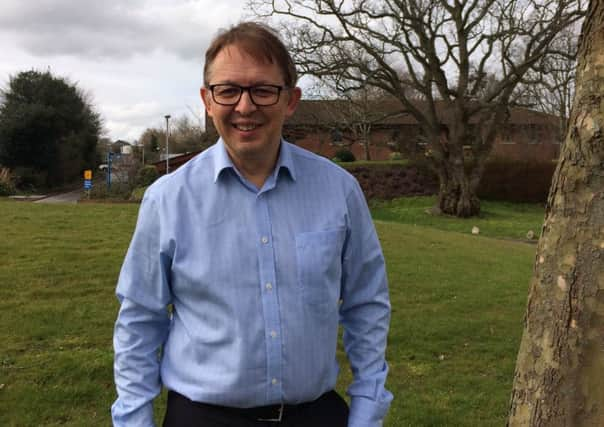Research is vital says Chichester man who suffered a rare form of stroke


In December 2016, David Higenbottam, 60, suffered a subarachnoid haemorrhage, which affects around 6,000 people in England each year.
Since then he has undergone an intense period of recovery to return to normal life, including going back to work as a research delivery manager for the National Institute for Health Research (NIHR).
Advertisement
Hide AdAdvertisement
Hide AdHe now hopes he can highlight the importance of advances in medical research supported by NIHR to improve outcomes for others.
A few days before Christmas 2016 he started to feel unwell: “Without warning, I started vomiting and was unable to get up. No drooping or slurred speech, I just felt really tired. I soon became very confused, developed eye pain and unclear vision,” explains David, who is married with two children.
“An ambulance arrived and I was transferred to St Richard’s Hospital where I was taken into resuscitation. I was no longer able to move my limbs at this point and was now incoherent. After a scan, my family were told that I’d suffered a catastrophic bleed in my brain and must be transferred to Southampton General Hospital (SGH) immediately – our nearest major trauma centre.”
David had an operation to stop the bleeding and was kept in intensive care for a couple of days with very high blood pressure and an infection.
Advertisement
Hide AdAdvertisement
Hide AdA serious, sometimes fatal condition, subarachnoid haemorrhages are most often caused by brain aneurysms (bleeds on the brain surface). It is not known why brain aneurysms develop in some people, although risk factors like high blood pressure have been identified.
Accounting for around one in every 20 strokes in the UK, a subarachnoid haemorrhage is a life changing condition. Whilst the outlook has improved, patients can be left with long-term problems like extreme tiredness and headaches.
David returned to work six months to the day of the bleed following both cognitive and physical rehabilitation.
“What I have discovered is, chiefly, that people are important. A personal support team of family, friends and work colleagues working with my medical team has been essential.
Advertisement
Hide AdAdvertisement
Hide Ad“Physically, I’ve been repaired, however, there are challenges associated with cognition and subtle changes in behaviour which myself and my family have noted following my hospitalisation. These include cognitive fatigue, which can be extremely frustrating, and contributes, at times, to a lack of self-motivation to take on everyday tasks. However, I have the support of my family who, as well as providing encouragement, are also there to motivate me.
“What is clear to me is that without the advances made in clinical practice because of medical research I would not be in a position to share my story. Whilst I was not eligible for one of the trials running at the hospital because of the additional complications of my condition, I encourage others to find out if they may be eligible.”
Dr Christopher Kipps, a consultant neurologist at University Hospital Southampton NHS Foundation Trust (UHS) and a local NIHR Neurology Specialty Lead said: “The Wessex Neurological Centre at UHS is very active in neurosciences research, and there is a major neurosurgical focus on brain haemorrhages. I’m sure this contributed to the excellent care that David received. In my experience, great care and great research walk hand-in-hand.”
Alongside his team, Mr Diederik Bulters, a consultant neurosurgeon at UHS, has been assessing the effect of an experimental drug on patients who have received treatment for a subarachnoid haemorrhage.
Advertisement
Hide AdAdvertisement
Hide AdHe said:“It is essential we work to improve outcomes for patients who have a subarachnoid haemorrhage as many of those who survive are left disabled and suffer long term cognitive and emotional problems, changing their lives forever.”
To find out what research studies are taking place visit www.ukctg.nihr.ac.uk/